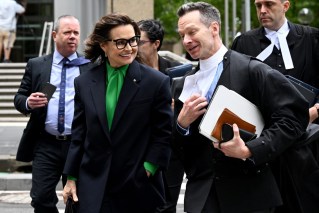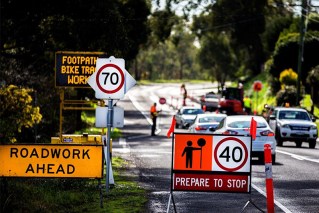It’s the end of the world as we know it … and I feel fine
Doomsayers have been predicting the end of the world as we know it for years. The pandemic has given them new material to work with, writes Robert MacDonald


The global pandemic has at least given the doomsayers something to agree on. (Photo: Unsplash, Jackson Simmer)
If you think this year’s been bad, wait till you see what’s next.
COVID-19 has encouraged the catastrophisers – those doomsayers and Cassandras always ready to predict the next great global crisis.
Not that they weren’t active before the pandemic.
In January this year, the World Economic Forum launched its Global Risks Report 2020, which would have gone to press just weeks before we first heard of the coronavirus.
But it didn’t need a global health crisis to find an apocalyptic angle. It had identified plenty of other things to be worried about.
“Burning Planet: Climate Fires and Political Flame Wars Rage”, was the muddled headline to its media release launching the report, which asked 750 “global experts and decision-makers” to rank their biggest concerns.
The result?
“Severe threats to our climate account for all of the Global Risks Report’s top long-term risks, with “economic confrontations” and “domestic political polarisation” recognised as significant short-term risks in 2020,” the WEF reported.
“This would prove catastrophic, particularly for addressing urgent challenges like the climate crisis, biodiversity loss and record species decline,” it declared ominously.
WEF president, Borge Brende, warned, with Old Testament vigour, that “the political landscape is polarised, sea levels are rising and climate fires are burning.”
(Fire and brimstone language and emphasising the worst possible outcome are common traits among those warning us the end is nigh unless we get our act together as quickly as possible.)
And then came COVID-19 to provide more fuel for the prophets of doom.
“Coming on the heels of severe climate impacts around the world, including droughts, floods, storms and fires, the coronavirus pandemic is a wake-up call to all of humanity that we need to do things differently,” warns the Australian-based Commission for Human Future.
The commission is chaired by former Liberal leader John Hewson and was founded a year ago “to raise awareness of the nature and scale of the catastrophic and existential threats we face, to share information about them and to help develop lasting solutions to them.”
Scaring us into action with warnings of the apocalypse and the end of humankind seems to be one of its tactics.
“The coronavirus pandemic appeared suddenly, without warning and took the world by surprise,” the commission says in a report released in April titled, Surviving and thriving in the 21st century – a discussion and call to action on global catastrophic risks.
“This shows how swiftly a catastrophic risk can appear and affect everyone, how short-term and blinkered our horizons, how vulnerable and unprepared we are for threats that can shake or collapse our civilisation, even extinguish us as a species.”
A global pandemic is just one of the “ten great catastrophic risks which face humanity and our civilisation as a whole” according to the commission.
It also identifies a range of environmental concerns, from a decline in natural resources, especially water, unchecked population growth, global warming, pollution and rising food insecurity.
And don’t forget nuclear arms and other weapons of mass destruction.
The solution? The obvious but nearly impossible one of getting everyone to work together for the common good.
Or in the commission’s words:
“There is a need to galvanise people everywhere to come together to debate, design and implement innovative strategies to transition to a sustainable world – and to avoid bequeathing an environmental and societal catastrophe to future generations”.
Should we be worried?
Possibly, but I’d suggest only if you don’t have faith in humankind’s proven ability to find solutions to the problems we confront, even if many of them were initially of our own making.
Yes, the doomsayers can take some cold comfort from the fact that the long-predicted global panic finally arrived this year.
And yes, many countries were woefully underprepared.
But barely 12 months on and, through the brilliance of scientists around the world, we are on the verge of a vaccine.
And many countries and economies are already beginning to show signs of recovery, thanks in part to the coordinated efforts of central banks, which learnt important lessons from the Global Financial Crisis of 2008.
I’d also suggest that while we pay attention to the arguments of the catastrophisers, we maintain a degree of scepticism and keep an eye out for hyperbole.
For instance, were “economic confrontations” and “domestic political polarisation” really the “significant short-term risks in 2020,” as identified by the World Economic Forum in January?
Australia is admittedly currently in a bind trying to work out how to find common ground with its biggest customer, China.
But an existential threat? Probably not, as long as our government and diplomats display a modicum of skill.
The WEF possibly had in mind Donald Trump’s America, when it identified “domestic political polarisation” as a risk for 2020.
And yes, the United States is deeply politically divided. But it has also just held a presidential election with a record voter turnout and is currently managing the handover over of power, admittedly with some hiccups.
I’m sure none of this recent evidence will mute the proselytisers of pending global catastrophe.
They must hope that if they keep at it long enough they’re going to have to be right one day – if only on the law of averages.













